Top 10 Best Ancient Civilizations
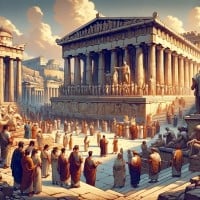
Everything we have today and everything we have achieved, we owe it to the Greeks. There is nothing, absolutely nothing, that the Greeks hadn't mastered. Today's architecture is based on Ancient Greek architecture. Literature started in Greece. Homer wrote the Iliad and the Odyssey thousands of years ago, and they are still read today because of Homer's unique style of writing.
Ancient Greek mythology is awesome. Their gods, their heroes, their monsters... everything has its root in Ancient Greece. Even the computer! Wherever you search, whatever topic it is, an Ancient Greek philosopher has likely written about it or even mastered it. Ancient Greece is undoubtedly the best civilization on the planet that ever lived.

Not many people know of this country, but the history behind it is absolutely amazing. The thing they are most known for making is wine, but they also created honey. Metallurgy was most likely invented there as well. Overall, an amazing place to visit and great history.
Evidence for the earliest occupation of the territory of present-day Georgia dates back to approximately 1.8 million years ago, as evident from the excavations at Dmanisi in the southeastern part of the country. This is the oldest evidence of humans anywhere in the world outside Africa.
Later prehistoric remains (Acheulian, Mousterian, and the Upper Palaeolithic) are known from numerous cave and open-air sites in Georgia. The earliest agricultural Neolithic occupation is dated sometime between 6000 and 5000 BC.

The Norse evolved from the barbarians who sapped away at Rome. Rome stole from Greece when it came to culture, architecture, and even land. Greece, of course, stole from Egypt, which has been a continually habitable nation for nearly six thousand years. While each of these peoples has drawn inspiration from others, only Egypt stands by itself - it is the foundation that holds up all Western civilization.
It is a civilization that made unparalleled progress in a land that was not even able to provide any wood, let alone nourish a civilization that would stand for millennia. The last of the standing Wonders of the World belong to Egypt, and it is considerably older than all the ones that rose and fell after it. Most of their achievements are a mystery to people even today, attesting to their creativity and unending ingenuity.

The Romans were way ahead of their time. While most citizens of the world were living in huts and eating wild animals and such, the city of Rome was already dealing with building height regulations (buildings had to be limited to six floors), traffic jams, and problems with indoor plumbing. Instead of a feudal-like society found elsewhere in the world, where you would die in the same status you were born in, you could be a simple soldier in Rome and become a senator, or a simple baker and become filthy rich. You could live in modern-day Spain, Egypt, or Bulgaria and still be a Roman citizen.
They had an advanced highway system, the likes of which are comparable to the interstate system, war machines in use even 1,000 years after Rome, and after the fall of Rome, Europe couldn't recover for another millennium. The effects of this civilization are felt today all over the Western world.
Although China was lagging behind Europe and America in a few recent centuries, China was far ahead of other civilizations in terms of science, economy, and social management. They invented paper and languages to record history, silk for covering our bodies, china and chopsticks to eat our meals properly, and cultivated so many plants to feed humans, along with hundreds of other inventions.
Most importantly, they gave their knowledge freely to the rest of the world.
Zhou Dynasty: Under the Zhou Dynasty, their greatest achievement was the flourishing of philosophy and ideas. Taoism, Confucianism, and Sun Tzu's The Art of War laid the foundation for China's future. Many technological advances were made, including the invention of the kite. They set the framework for effective governance and social harmony. Ideas such as the Mandate of Heaven came about.
Han Dynasty: The Han Dynasty rivaled the Roman Empire in terms of technology and wealth. China accounted for 25% of the world's wealth and about one-third of its population. The imperial examination system and a meritocratic governance system were established. They expanded their territory to its greatest extent. Notable inventions include the crossbow, repeating crossbow, and seismometer. Vietnam and Korea were conquered and given Chinese civilization.
Tang Dynasty: Considered a Golden Age of China, some scholars insist that it held around 50% of the world's wealth. It was home to the Silk Road. At this time, the Tang Dynasty was a dream country. Japan willingly copied the Tang's clothing, culture, and architecture. The Tang was a superpower, only rivaled by the Abbasid Caliphate. It was a time of great military and cultural superiority. The ideal country, and the capital, became one of the first great multicultural cities - Indians, Persians, and Jews lived there, with a total of 1 million people.
Song Dynasty: The Song Dynasty had no equal, with some estimates ranging from 50-70% of the world's GDP. It was an early modern economy, producing more steel in 1000 AD than all of Europe did in 1700. Its citizens were the richest, bar none. The compass, gunpowder, and printing were invented during this time. Some historians today assert that had the Song not fallen to the Mongols, China could have industrialized many centuries before Europe and conquered the world.
Ming Dynasty: Simply awe-inspiring, the Ming Dynasty accounted for 40-50% of global wealth... more
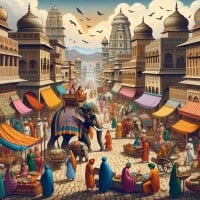
India was one of the two major ancient Asian civilizations, along with China. The city of Mohenjo-Daro was one of the most innovative in ancient times, with plumbing, and was comparable to the cities of the Fertile Crescent. Later on, Aryan migrations brought their beliefs, combining with traditional Indian religions. Two of the major world religions, Hinduism and Buddhism, were developed.
Large empires such as the Mauryan and Gupta Empires were established. There were also achievements such as Arabic numerals, the understanding of zinc, better-quality medicine, the works of Kalidasa, yoga, knowledge of orbits in the solar system, algebra, the oldest dam in the world, snakes and ladders, chess, stupas, and more.
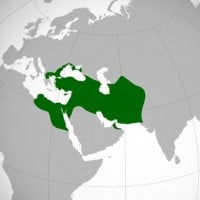
Persians started the world's first largest empire, which was founded on morals. Persian kings did not believe in slavery and created the first declaration of human rights. They contributed so much to our world by creating the world's first gardens, inventing wine, alcohol for medical use, and being the main influence for Mediterranean food.
They invented the kebab, birthday parties, the first monotheistic religion, the first feasts, domestication of horses, backgammon, and their architectural influences spread to Europe, among other things. They have a history that dates back to almost 9,000 years!
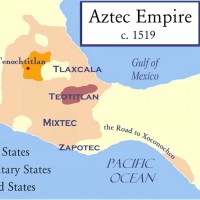
European disease practically wiped out all the grandeur of this highly civilized society, which had not reached its peak when the Spanish invaders destroyed it. Many criticize it for its practice of human sacrifice, but the truth is most countries in Europe were killing more of their own people on a statistical level.
Tenochtitlan was an enormous city that stunned the Europeans when they first saw it. It had public schools, universities, hospitals, a high level of social structure, and education was free. It was bigger than any European city of its time and was filled with botanical gardens, none existing in Europe. Streets were clean, unlike European cities with ankle-deep sewage. Aztec poetry and philosophy were even more abundant than the better-known Greek productions.
It is also a myth that European superior technology defeated the Mexica Empire. It was disease. 95 percent of the 80 million native people of the Americas were wiped out in a few years after the arrival of the Europeans. And to think that most of the continent was not just highly populated but also highly developed, with technologies unknown in Europe.

Although the Mongols and Huns are considered by some to be barbaric without influential cultural artifacts, etc., they should be considered very influential in world history by the fact that they had a huge impact on the forming of today's great nations (such as China, Russia, and so on). Also, if we consider the military to be an achievement, the military of Mongols and Huns should be considered the "Tour de force" of humankind.
And yes, they were mass killers. They threatened the so-called cultured civilizations. But it was what they did to survive in their land of harsh, the leftover lands of cold and hot. Seriously, people have been choosing to live in Hawaii rather than Anchorage.
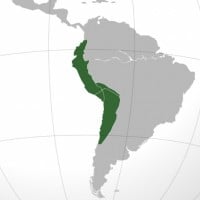
A culturally rich empire, the Incas assimilated many cultures. Their socioeconomic and political system was very developed, making the Inca Empire highly organized for their time. In times where other parts of the world suffered from starvation, the Incas had food reserves for the bad times, making their population virtually impervious to hunger or famine. They had a tax system called the "mita," which was a labor tax system.
The Inca Empire covered a very large geographical area, in fact, the largest in the Americas, and included countries such as Colombia, Ecuador, Peru, Bolivia, Chile, and Argentina. They had a very developed system of canals and aqueducts that provided irrigation and filtered water to their population. They were probably one of the few developed ancient civilizations that did not communicate with writing (because they did not know it) but had an alternative way to store communication called the "Quipus." Their constructions, which are still standing, are out of this world.
Small yet mighty, no warriors in history ever did or ever will outmatch the men of Sparta. Having trained since the age of seven, their military career ended either when they reached an old enough age that they could not fight too well (most likely their mid-sixties), or it simply ended when they died. In their daily lives, they took up no other work except being soldiers. Everything they did was geared towards warfare, even the music they listened to.
They trained every day from when the sun rose in the east to when it set in the west. The training was the harshest known to man. To this day, from the youngest of ages, the boys were beaten near to death, flogged to test endurance, and in most cases were killed during training. Once training was complete (after some 15 years of non-stop surviving), only then would they be given citizenship.
And then there's the legacy of Leonidas and the 300 at Thermopylae, which has become legend - an almost unbelievable story of courage, duty, and bravery. Let us never forget the legends of Lakedaimonia, for they left no monuments like Egypt, no poems like Athens, and no signs of great engineering like Rome. What they left instead were tales of their strength and bravery, a reminder to the world that they truly were the finest soldiers the world will ever know.
Ancient Macedonia was not Ancient Greece - it was Hellenistic, or an imitation of Greek culture. Alexander the Great led the Macedonian empire and was able to claim the largest empire in history, spanning from Greece all the way to India. If Alexander's soldiers hadn't grown tired of war and wanted to go back to their families, Alexander would probably have been able to conquer even more.
Ancient Greeks were Macedonians, not the other way around. There should be people who have studied history to tell everything correctly. Nobody can change history! Everyone can predict anything, everyone can change said words, or tales, stories, but nobody, nobody can change the written evidence!
Alexander the Great was Macedonian, and the Greeks were Macedonians, except those who lived near Athens. You should read first, educate yourselves, then you should dare to speak about history!
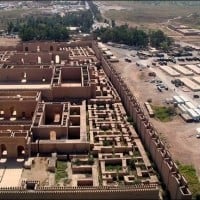
The birthplace of the oldest hero in history, Gilgamesh, the Babylonian Empire was honestly the best civilization in history. They were the first to invent many important things, which proved how smart and amazing they were. These inventions include the wheel, the chariot, the sailboat, time, the map, writing, mathematics, astronomy, and astrology.
It's really overwhelming to stand next to the Ishtar Gate and think it was built by the very hands of those creative people. It truly deserves the name of The Cradle of Civilization.
Latest LiDAR maps show the Mayan world probably had upwards of 20 million people and an agricultural capability rivaling what California produces today. The Mayans were not a city-state but a megalopolis connected by causeways and canals. Couple this with their language, art, math, and astronomy, and the Mayans belong with the Chinese, Egyptians, etc. Amazing stuff, really.
The Mayans, a civilization wiped out swiftly by the savage Europeans before they could prove how impressive their work had been in civil engineering, mathematics, astronomy, and agriculture. The Mayans, with their great cities and histories, were wiped out, and their achievements, culture, and ancient past were completely forgotten and obliterated.
Turks have established 18 empires throughout their history and have conquered all of the known world. The West has had to make up alternative narratives to curtail Turkish nationalism from reemerging in its greatness and dominating the Middle East and Europe in the 20th century.
The most significant legacy in most of Central Asia, the Black Sea, and Eastern Europe is of Turkish origin. The world has never known more powerful and benevolent conquerors than the Turks, and the Turks will soon rise again in their ferocious glory.
Japan is an ancient country with great buildings and innovation, such as the ironclad. Despite having a great population on a little land, even in the 11th/12th century, Japan had more people than all the European countries. It had impressive urbanism in its great cities, such as Edo. The Japanese people had Murasaki Shikibu, the most ancient literary book writer, having written the Genji Monogatari, the oldest romance in the world.
Not very well known because of its cut-off trade system, Japan was filled with knowledge, logic, and brilliant ideas. There were emperors, samurai, and geisha. Fantastic paintings and art were created.
Vikings led fleets of longships throughout Europe in a campaign to invade and ransack other civilizations to obtain their resources. The Vikings also discovered America before any other Easterners. However, due to a lack of resources and personnel, they left it and returned home.
People may think of Vikings as mindless savages, but in reality, their civilization produced enormous changes in technology, seafaring abilities, and many other advancements.
The Norse civilization should be number 1. The Norse people were Germanic people who settled in Scandinavia. They had to live in one of the hardest places to farm, and back then, if you had a poor crop harvest, you would starve. But they got past that by raiding and trading with other European settlements to get food.
The Vikings were also very good explorers and sailors, being the first Europeans to discover Greenland and Canada. The Vikings could also navigate using the stars. Also, the Viking civilization never fell like Greece, Egypt, and Rome did. They just stopped being Vikings when they were converted to Christians.
One thing that probably made the Assyrians so great at fighting was their philosophy that if they ever lost a battle, their empire would crumble and end. The Assyrians seemed invincible and conquered the entire region. They were able to strike fear into the hearts of their enemies. The Assyrians were also one of the most brutal peoples.
I'm learning about the Assyrian Empire in school. The Assyrians used ziggurats to worship their gods and held religious ceremonies to make food sacrifices. Note - they did not make human sacrifices - that's good!
The Indus Valley was the most advanced of the old civilizations. I daresay it was better than Mesopotamia, Egypt, Greece, China, Turkey, Japan, Tibet, the Mongols, and even the bloody Romans. I think it was even superior to 17th and 18th-century England (the Indus Valley had toilets). It should be a civilization to be remembered for all time and history.
The Indus Valley was extremely advanced with their water and sewer systems. They learned to trap the water every year during the flood and use it all year for drinking water and to water crops. They mysteriously disappeared, and still, no one knows what happened to them. Pretty cool.
The Songhai Empire could possibly have been even better than Mali. They had complex urbanization, complex security surveillance, and impressive knowledge for education. When they took over the Mali Empire, they inherited a large collection of book knowledge, which could possibly have been half a billion or even more. Knowledge from aphrodisiacs to space and time is well documented.
The Songhai Empire was one of the largest in history. Its bureaucracy was the most advanced in the Middle Ages. By the 14th century, most of Europe and Asia did not even have prisons. Songhai had professional prisons, courts, lawyers, and arguably the more organized system of criminal justice at that time.
Ancient Mesopotamia might not be here anymore, but the civilization was great. Mesopotamia was one of the first civilizations. They invented many things we have today, but with better improvements.
Some say they're the oldest civilization.
They have such an interesting variety of inventions because of the war.
The country's soil is fertile because the crops of that time are still grown today.
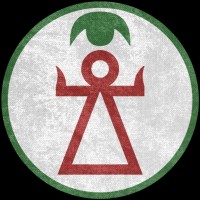
This should be number 1 in Africa. Carthage is situated on the coast of North Africa, in what is now Tunisia. It developed into a significant trading empire throughout the Mediterranean and was seen as home to a wealthy and brilliant civilization.
After a long conflict with the emerging civilization of Ancient Rome, known as the Punic Wars, during which advantage shifted from one side to the other, Hannibal conducted a campaign in Italy after first crossing the Alps. The tactical genius of Hannibal is still studied in our time. This is the best civilization ever, and it should be number 1.